Poor market sentiment in Tuesday’s ASX session had a say in how the latest profit results from appliance maker Breville, e-tailer Kogan and discount chain The Reject Shop were received.
…………
Small appliances group Breville (ASX: BRG) has managed to shake-off higher costs, weaker sales in a key market and lift revenue, earnings and dividend for the year to June 30.
The company told the ASX in its 2021-22 result on Tuesday that revenue rose to a record $1.4 billion in the year, it saw double digital earnings growth and the full year dividend of 30 cents a share was up 13.2% from 2020-21’s payout.
That all chimed well with investors on a day when sell was the preferred option. As a result, Breville shares rose more than 3% to $22.19 at one stage before succumbing to the selling pressure to close down 2 cents at $21.45.
Breville said the Americas, its largest region, saw a pickup in June half sales that was more than enough to help offset a slowdown in Europe as consumers and retailers reacted negatively to the war in Ukraine.
That in turned helped the company maintain gross margins “with demonstrated pricing power in the global segment, offsetting an inflationary backdrop of increased freight and product costs and a strong USD.”
Earnings before interest and tax (EBIT) guidance of $156 million was “maintained and met delivering another year of double-digit profit growth,” the company said on Tuesday.
The company said EBITDA rose 14.4% to $186.8 million and net after tax profit jumped 16.2% to $105.7 million.
And the final dividend of 15 cents a share was up from the 13.5 cents paid for the June, 2021 half.
According to CEO Jim Clayton it was “A solid year of performance for the Group, delivering guidance once again, against a dynamic backdrop of supply chain challenges, inflationary pressures, and headwinds resulting from the Ukraine invasion.
“Having doubled the size of the business in the last 4 years, the strength of our geographic portfolio came through in FY22 as the Americas accelerated in the 2H to pick up the slack in Europe. We managed margins well, demonstrating the pricing power of our brand and our premium products.
“The investment in growth drivers continued, while demonstrating the ability to align expenses with revenue, within the envelope of guidance,” Mr Clayton added.
Looking ahead, Mr Clayton said, “We enter FY23 in a solid position: we’ve successfully pulled forward our inventory build for 1HFY23, and our NPD pipeline is beginning to release.”
“The financial year ahead appears to be one of competing macro headwinds and tailwinds. In addition, Breville brings the tailwinds of new product launches, maturing new geographies, and cost improvements to the year. It is too early to predict how these forces will play out across the whole year, but in the first few weeks of FY23 sell-out is up on the pcp, and we are on plan for 1H23.”
…………
Kogan (ASX: KGN), the e-commerce and marketplace company, is moving to change its approach by not trying to be everything to as many online consumers as possible.
While the company declined to provide any 2023 guidance, the changes now underway as it continues to cut inventory levels down and costs, tells us a lot about the realities of the coming year for the once online shopping ‘hot’ spot.
It’s all about cutting, consolidating and trying to rediscover positive earnings. Dividends have been dumped, so no more value story. Now it’s all about growth, but growth at an economic cost and not unchecked.
CEO Ruslan Kogan said in Tuesday’s financial statement the company had bet wrongly that the trend of surging online sales in the first year of the pandemic would continue, leading the company to expand its range and inventory footprints more than necessary.
That saw it get caught with too many products and too much stock as consumers returned to bricks and mortar retailing instead of continuing to load up online.
While revenue and profit in the June 30 year both fell, Kogan said its adjusted EBITDA showed a small improvement in 4Q FY22 of a $1.5 million positive result. That momentum carried through July.
Revenue for the June 30 year dropped 8% to $718.5 million and gross profit declined 9.3% to $184.4 million.
Kogan reported a statutory loss of $35.5 million for 2021-22 financial year.
Adjusted earnings declined to $18.9 million as the company dealt with excess inventory levels and holding costs and the adjusted net loss figure was a much smaller $2.9 million compared to the statutory figure.
There was no dividend paid for the year to June 30.
The company said on Tuesday it was now focused on operational efficiency and has taken steps to reduce costs including reducing the range of underperforming product categories.
Inflation in delivery costs has led to a price increase for its loyalty program, Kogan First, which will increase from $59 to $79.
Kogan said the price increase was necessary for the sustainability of the program, but claimed members still works out to be worth it.
The shares lost more than 8% at one stage yesterday and they ended down 6.5% at $3.55.
…………
Meanwhile no dividend at Reject Shop Ltd (ASX: TRS), but there will be a small buyback.
Shares in the small cheap as chips general products retailer slid nearly 5% yesterday despite the company revealing the $10 million buyback.
While the company reported a 1.2% rise in sales to $788.2 million, its statutory net after tax profit fell 5% to $7.9 million and other favoured measures did worse.
‘Normalised’ net profit after tax tumbled 24.15 to $4.9 million while ’normalised’ earnings before interest and tax (EBIT) of $6.9 million were down 26.7% from 2020-21.
TRS said the buyback will be partly in lieu of a dividend for the June year. It will start next month and will see the repurchase of “approximately 2.2 million shares or approximately 5.8% of issued capital”.
The shares ended down 4.9% at $4.29.
Reject Shop management blamed the weak earnings on the Covid Omicron outbreak which “adversely impacted store foot traffic in the lead up to the key Christmas trading period” of FY2022,” with the company noting that sales across December and January were negatively affected.
However, sales between March and June were far more positive following this period and sales saw positive same store growth.
TRS CEO, Paul Bishop said FY22 has been a challenging year for the company.
“The discount variety sector has an important role to play in helping Australians navigate this difficult economic time and, as Australia’s largest discount variety retailer, I believe The Reject Shop can have a meaningful impact by offering our customers both branded consumables as well as exciting general merchandise at a low price.
“I look forward to The Reject Shop delivering an improved and differentiated merchandise offer that strongly appeals to customers, which is expected to deliver comparable sales growth and create value for all shareholders.”
And looking to 2022-23, TRS didn’t provide firm guidance, but made it clear it was looking for improved trading.
The company highlighted its plans to open 25 new stores this financial year, as well as close between five and ten underperforming stores.\\
In addition, TRS said its 2023 focus will be “on generating comparable store sales growth, which is expected to be supported by an improved product offering with more great deals on branded consumables as well as new and exciting general merchandise”.
It said it will also be focusing on “managing the impact of inflation on gross profit margin and operating costs”.













